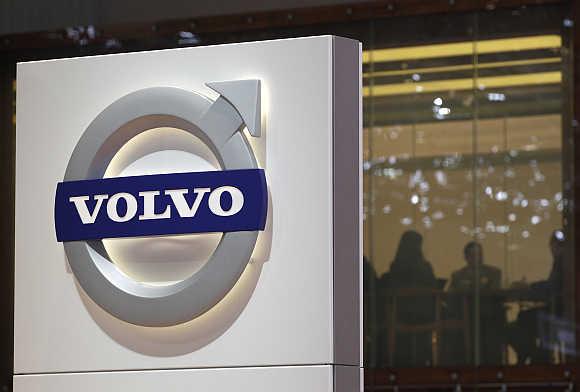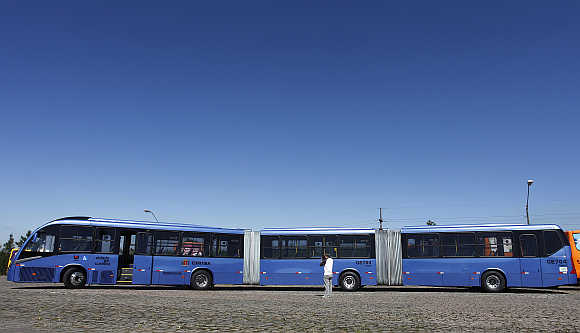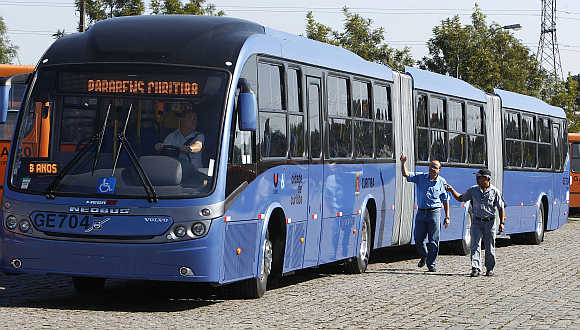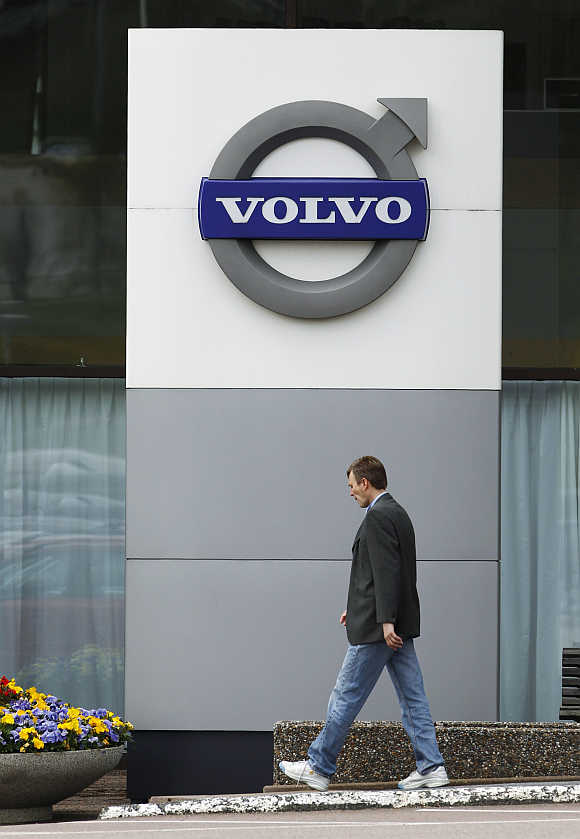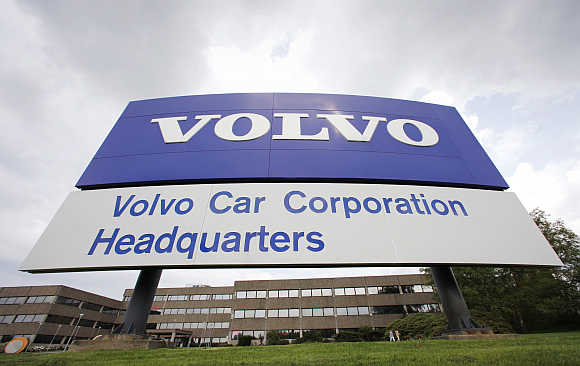 | « Back to article | Print this article |
Volvo sees rising competition in luxury bus segment
Last month, Volvo AB Chief Executive Olof Pearson announced an investment of Rs 2,000 crore (Rs 20 billion) for its bus division in India. Pearson had enough reasons to be pleased with his top team in the country.
For, there isn't any doubt that Volvo has capitalised well on its early mover advantage in the luxury bus segment in India, with a dominant 74 per cent share.
The sales volumes have been modest - 5,000 in 11 years - which is expected in a country that is just about waking up to super-luxury travel by road. But the pace of change in the Indian traveller's mindset is picking up, as is evident from the fact that the railways had to stop the Shatabdi service between Mumbai and Pune for a while because of the growing popularity of the Volvo bus service on the expressway linking the two cities.
That's quite a distance from the advice Volvo had got from an agency it had appointed 11 years ago to ascertain the market potential for low-floor air-conditioned bus service in India. The agency's findings: Volvo will be able to sell only two buses a year for quite a few years to come.
Click NEXT to read more...
Volvo sees rising competition in luxury bus segment
The reason was simple: the cost of the buses was five times more than what was being offered by domestic players such as Tata Motors and Ashok Leyland at that time. The initial experience was exactly in sync with what the agency had predicted: in fact, Volvo's salespersons could not continue with a sales pitch for more than five minutes.
Apart from the price, the other stumbling block was the question: "Where are the repair shops that can support these buses?" Volvo has been able to answer that question since then, so much so that the brand has in many ways become synonymous with luxury bus travel in India.
But Akash Passey, senior VP of Volvo Bus Corporation, is restrained in his response: "Yes, we have had a successful journey so far, but we are in no way sleeping on our success."
The reason why Passey and his team would have to be wide awake is the competition it is now facing from global rival Mercedes Benz which operates in the same price segment of Rs 70 lakh to Rs 1 crore (Rs 10 million) per bus.
In fact, the Bihar government last year started a luxury bus service in public-private partnership with Hyderabad based Gireesh Infrastructure which ordered 92 buses, a majority of which were Mercedez Benz products.
Click NEXT to read more...
Volvo sees rising competition in luxury bus segment
"We left the choice of buses on the operator which preferred Mercedez buses," says Uday Singh Kumawat, managing director, Bihar State Road Transport Corporation.
Even domestic players such as Tata Motors are gearing up with new product lines to catch up on the lost market. Tata, which did not have a presence in the fully-built luxury bus market, has made its intention clear with the launch of Tata Divo.
Passey is, however, unfazed by competition and says, "We are on the right track to create value for the operator and provide complete solution."
His confidence stems from the hard work put in by the company in a market where luxury bus was earlier synonymous with those with push-back seats. The company first failed in its attempt to sell its city bus, B10LE, after demonstrating it to key stake holders. It, in fact, bid for a tender called by Delhi Transport Corporation in 1998, but did not succeed after the tedious process.
Volvo then realised that it was easier to change the perception of its customers in the inter-city segment where private operators were involved. Volvo took the value-selling approach by actually demonstrating to the operators their financial gain even if they buy a highly-priced product.
Click NEXT to read more...
Volvo sees rising competition in luxury bus segment
Its buses could run longer in a day without breakdowns, could carry 10 per cent more number of passengers per trip and could offer comfort and service for which customers would be willing to pay. The beginning was modest - Volvo sold two units of its inter-city bus B7R in Bangalore in October 2001.
Unlike other existing players such as Tata Motors and Ashok Leyland, it did not sell just the chassis but the complete bus with the body. It provided all services including after-sales support, parts and even driver training under one roof. More than developing a dealership sales channel, it solely depended on corporate sales.
The Bangalore-Kochi route became one of the first examples of the change. Before the entry of Volvo, this route accounted for 20 luxury buses - all non AC. By 2004, this grew to 40 Volvo luxury buses. The inter-city business also picked up. Volvo debuted in the segment after it sold 25 buses to the Bangalore Municipal Transport Corporation - six years after it was first demonstrated.
Today the city has 570 air conditioned buses from Volvo, besides 50 from Corona and 90 from Tata Marcopolo. The fares for the luxury buses is two and a half times more than the normal buses.
Click NEXT to read more...
Volvo sees rising competition in luxury bus segment
"The initial three to four years were a struggle," admits Anjum Parwez, managing director, BMTC. "But eventually it became a huge success with upper middle class travellers."
The Karnataka State Road Transport Corporation currently has over 500 Volvo buses.
"Volvo continues to enhance customer experience; hence customers are willing to pay for the same," says N Manjunatha Prasad, managing director, KSRTC which recently included 14.5 metre long multi-axle Volvo buses in its fleet that has chemical toilet and pantry.
Wilfried Aulbur, managing partner Roland Berger Strategy Consultants India, says companies are now expected to lower prices to expand the market. The point about pricing could be the next food for thought for Volvo in India.
